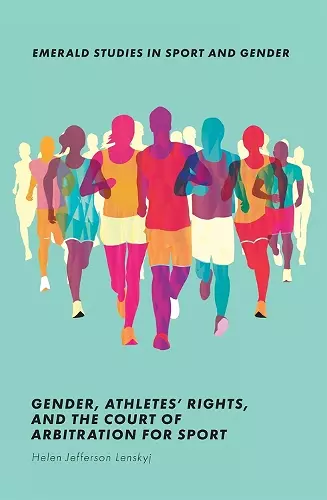Gender, Athletes' Rights, and the Court of Arbitration for Sport
Helen Jefferson Lenskyj author
Format:Paperback
Publisher:Emerald Publishing Limited
Published:28th Sep '18
Should be back in stock very soon

Disputes over gender, doping, and eligibility in Olympic sport are widely covered in sport studies and in the mainstream media. Less well known are the functions of the Court of Arbitration for Sport (CAS), and the threat it poses to athletes’ rights by depriving them of access to their own countries’ court systems. CAS loosely follows the model of international arbitration tribunals. As in forced arbitration outside of sport, employees – in this case, high performance athletes – sign contracts agreeing to arbitration rather than litigation as the sole means of dispute resolution.
Promoting the concept of sport exceptionalism, the International Olympic Committee (IOC) justifies the power it exercises through CAS by claiming that sport must be autonomous and self-regulating, with disputes settled by specialist arbitrators. Arguments in support of this position point to lex sportiva (global sports law) as a valid legal principle in sport-related disputes, which, it is claimed, cannot be understood or resolved by non-specialists. Self-regulation works effectively to protect the Olympic industry brand by keeping disputes ‘in the family’.
This critical analysis of CAS's history and functions demonstrates how athletes’ rights are threatened by the forced arbitration process at CAS. In particular, CAS decisions involving female and gender-variant athletes, and racialized men and women, reflect numerous injustices. As well as the chronic problem of CAS’s lack of independence, other issues examined here include confidentiality, lex sportiva, non-precedential awards, the closed list of specialist arbitrators, and, in doping cases, questions concerning strict liability and burden of proof.
'We've waited ten years for this book. Professor Lenskyj is the only person who could possibly have written it.'
-- Dr David McArdle'Drawing on the decisions of the Court of Arbitration for Sport and the Swiss Federal Tribunal between 1986 and 2018, as well as those of other courts, arbitration and disciplinary panels, and other sources, the author examines the history and functions of the Court of Arbitration for Sport as the place for a sport-specific and confidential dispute resolution process for Olympic and international athletes, particularly cases involving women and ethnic minorities. She considers how gender, race/ethnicity, and other social factors affect outcomes in Court of Arbitration for Sport cases. She explores general trends in alternative dispute resolution and debates about arbitration vs. litigation, as well as historical and contemporary developments in sports law, the influence of sport exceptionalism as a guiding principle, the problems of "stacked decks" and "repeat parties" in Court of Arbitration for Sport disputes, and the impacts of gender in these areas, then the "war against doping" and the strict liability principle, as well as the impact of gender and race/ethnicity on the outcomes of doping-related appeals, issues of gender policing and gender variance and testosterone-related controversies, and Court of Arbitration for Sport decisions on matters of doping and discipline.'
-- Annotation ©2018 * (protoview.com) *'In Inside the Olympics Industry: Power, Politics, and Activism, Lenskyj suggested that the Olympic industry should be dismantled. The current volume reaches a similarly stark conclusion about the CAS, namely, reforms are inadequate and radical solutions are necessary. The incisive analysis in this volume, attributable to Lenskyj’s research and the insights she has gained over the course of a long career studying power and sports, make Gender, Athletes’ Rights, and the Court of Arbitration for Sport unfailingly thought provoking.'
-- Evan C. Rothera, Sam Houston State University in Journal of Sport History, 2019'I have no doubt that Gender, Athletes’ Rights, and the Court of Arbitration for Sport is well worth reading from any other perspective than a lawyers’ as well, but regardless of the perspective I do think it should be read from a critical standpoint. A good critique deserves to be seriously criticised.' -- Mikael Hansson, School of Law, University of Gothenburg
'Given the plethora of bold and interesting ideas Lenskyj raises, this book is a must read for anyone interested in human rights in sport.'
-- Sarah Teetzel, University of ManiISBN: 9781787542402
Dimensions: 198mm x 129mm x 13mm
Weight: 256g
263 pages